外研版(2019)必修三Unit 5-What an adventure!单元核心考点解析&随堂专练学案(含答案)-Section B
文档属性
| 名称 | 外研版(2019)必修三Unit 5-What an adventure!单元核心考点解析&随堂专练学案(含答案)-Section B | 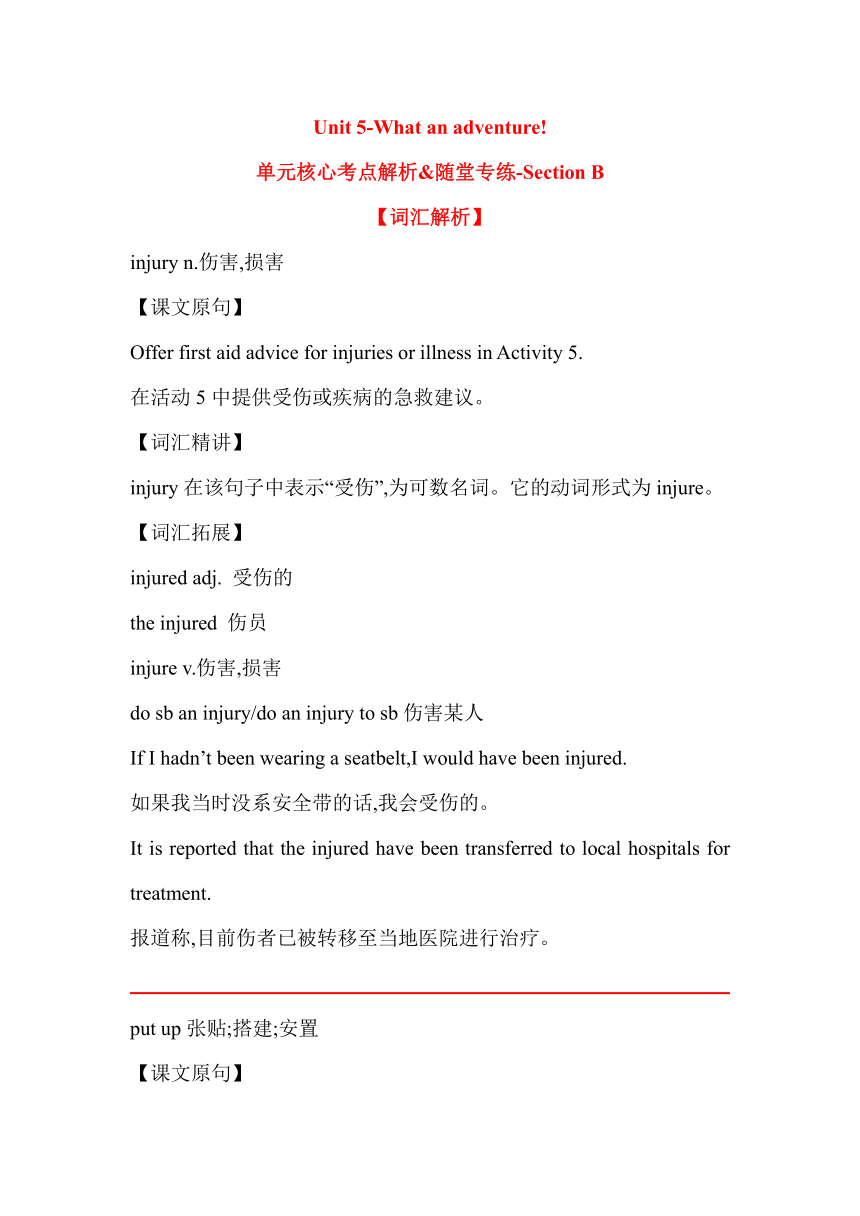 | |
| 格式 | doc | ||
| 文件大小 | 70.5KB | ||
| 资源类型 | 教案 | ||
| 版本资源 | 外研版(2019) | ||
| 科目 | 英语 | ||
| 更新时间 | 2021-06-01 11:06:39 | ||
图片预览

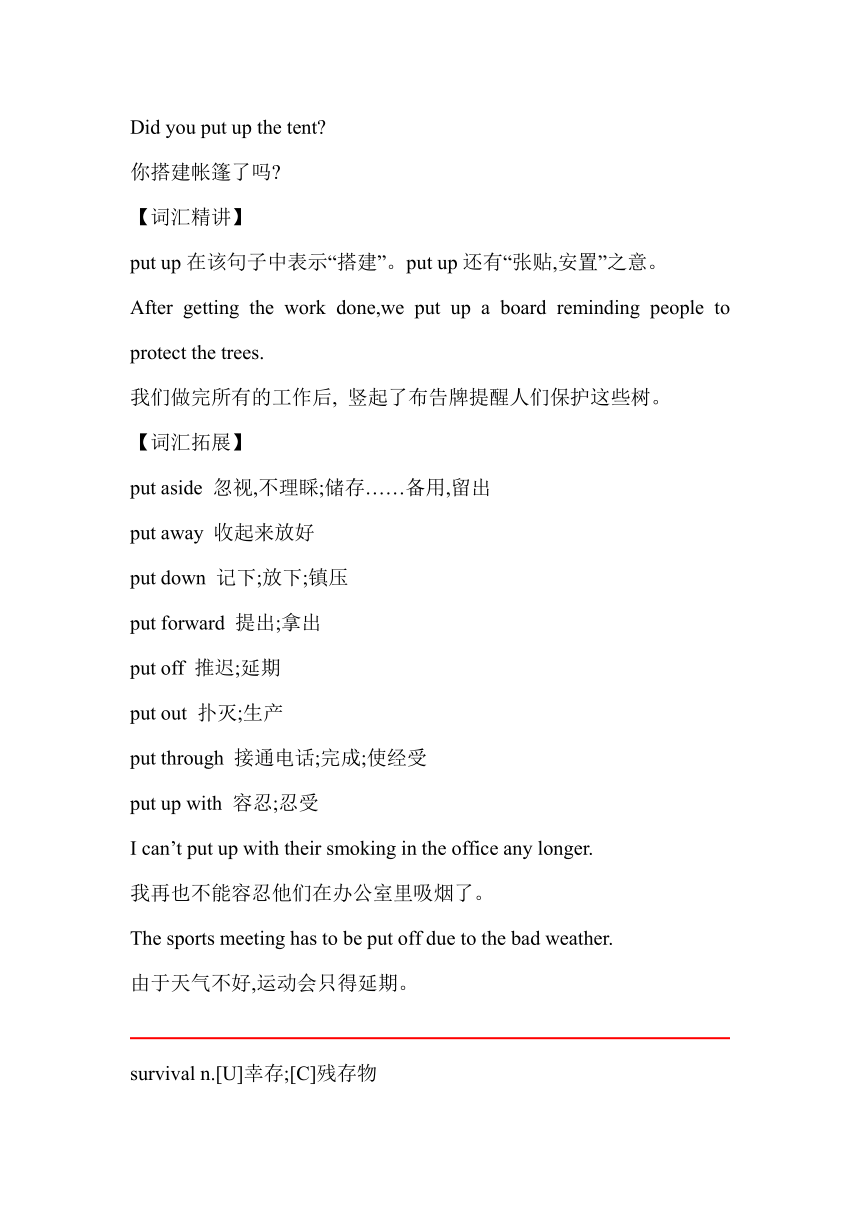
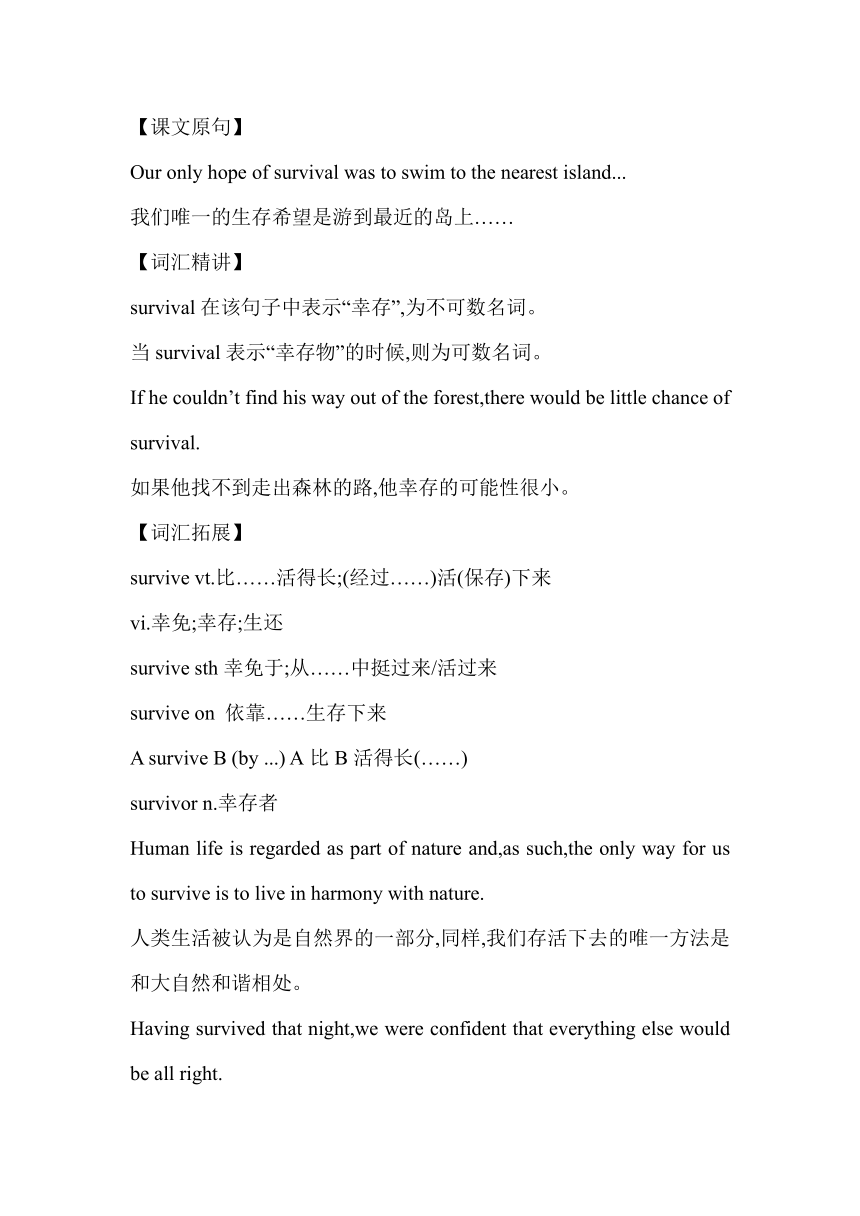
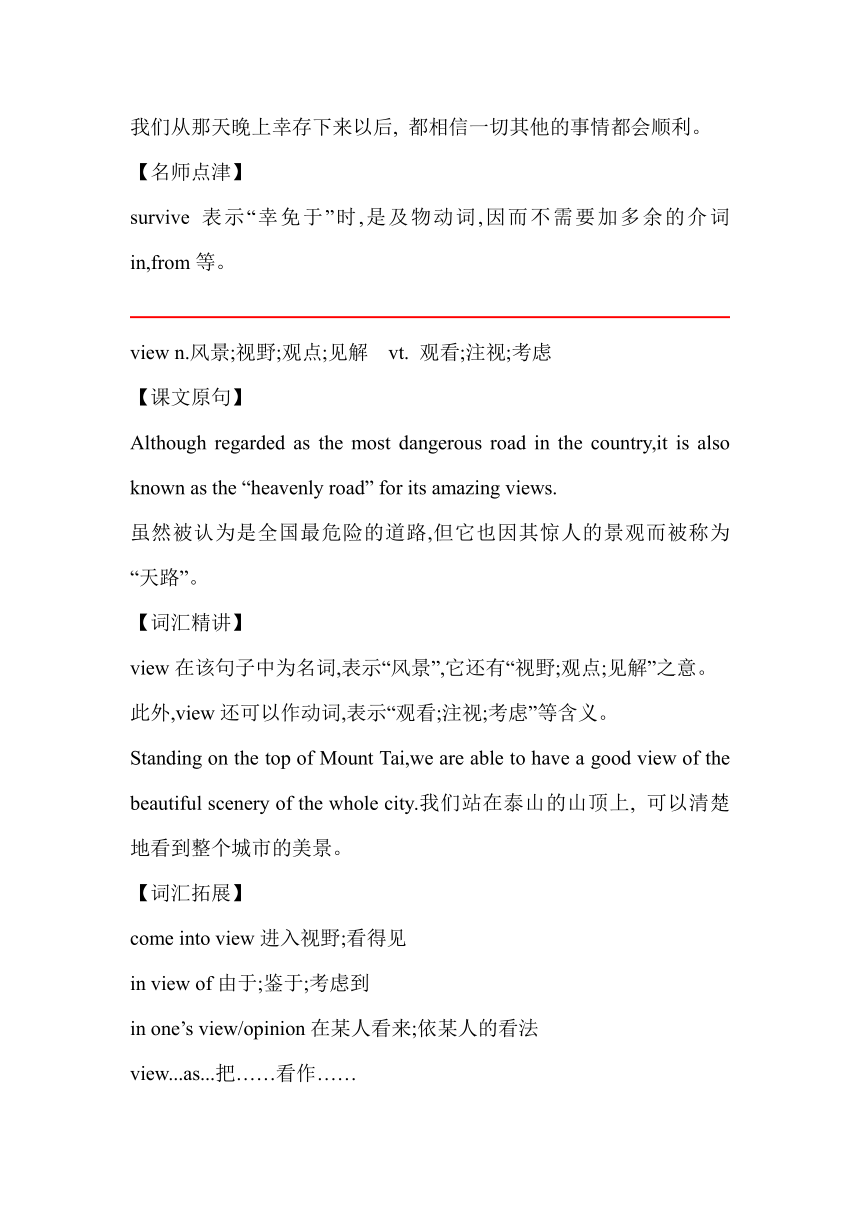
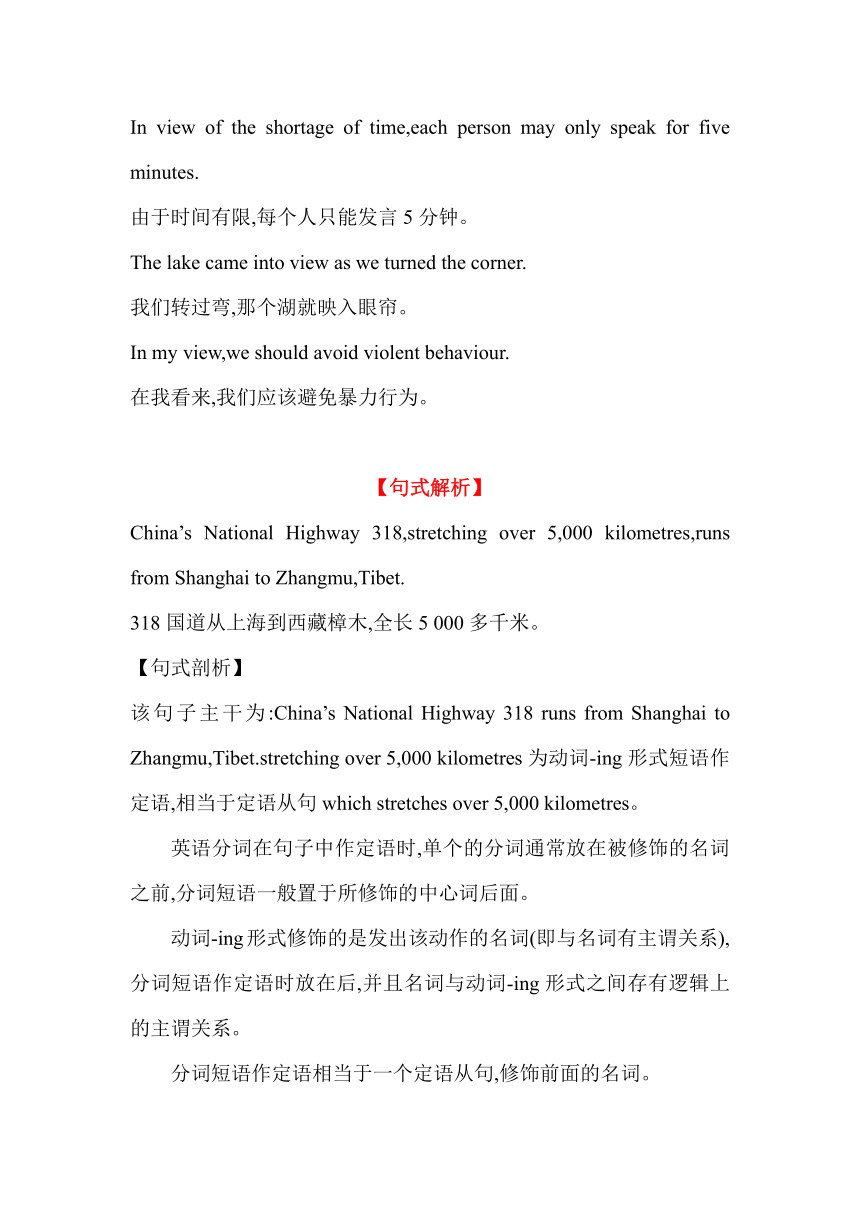
文档简介
Unit 5-What an adventure!
单元核心考点解析&随堂专练-Section B
【词汇解析】
injury n.伤害,损害
【课文原句】
Offer first aid advice for injuries or illness in Activity 5.
在活动5中提供受伤或疾病的急救建议。
【词汇精讲】
injury在该句子中表示“受伤”,为可数名词。它的动词形式为injure。
【词汇拓展】
injured adj. 受伤的
the injured 伤员
injure v.伤害,损害
do sb an injury/do an injury to sb伤害某人
If I hadn’t been wearing a seatbelt,I would have been injured.
如果我当时没系安全带的话,我会受伤的。
It is reported that the injured have been transferred to local hospitals for treatment.
报道称,目前伤者已被转移至当地医院进行治疗。
put up张贴;搭建;安置
【课文原句】
Did you put up the tent?
你搭建帐篷了吗?
【词汇精讲】
put up在该句子中表示“搭建”。put up还有“张贴,安置”之意。
After getting the work done,we put up a board reminding people to protect the trees.
我们做完所有的工作后, 竖起了布告牌提醒人们保护这些树。
【词汇拓展】
put aside 忽视,不理睬;储存……备用,留出
put away 收起来放好
put down 记下;放下;镇压
put forward 提出;拿出
put off 推迟;延期
put out 扑灭;生产
put through 接通电话;完成;使经受
put up with 容忍;忍受
I can’t put up with their smoking in the office any longer.
我再也不能容忍他们在办公室里吸烟了。
The sports meeting has to be put off due to the bad weather.
由于天气不好,运动会只得延期。
survival n.[U]幸存;[C]残存物
【课文原句】
Our only hope of survival was to swim to the nearest island...
我们唯一的生存希望是游到最近的岛上……
【词汇精讲】
survival在该句子中表示“幸存”,为不可数名词。
当survival表示“幸存物”的时候,则为可数名词。
If he couldn’t find his way out of the forest,there would be little chance of survival.
如果他找不到走出森林的路,他幸存的可能性很小。
【词汇拓展】
survive vt.比……活得长;(经过……)活(保存)下来
vi.幸免;幸存;生还
survive sth幸免于;从……中挺过来/活过来
survive on 依靠……生存下来
A survive B (by ...) A比B活得长(……)
survivor n.幸存者
Human life is regarded as part of nature and,as such,the only way for us to survive is to live in harmony with nature.
人类生活被认为是自然界的一部分,同样,我们存活下去的唯一方法是和大自然和谐相处。
Having survived that night,we were confident that everything else would be all right.
我们从那天晚上幸存下来以后, 都相信一切其他的事情都会顺利。
【名师点津】
survive 表示“幸免于”时,是及物动词,因而不需要加多余的介词in,from等。
view n.风景;视野;观点;见解 vt. 观看;注视;考虑
【课文原句】
Although regarded as the most dangerous road in the country,it is also known as the “heavenly road” for its amazing views.
虽然被认为是全国最危险的道路,但它也因其惊人的景观而被称为“天路”。
【词汇精讲】
view在该句子中为名词,表示“风景”,它还有“视野;观点;见解”之意。
此外,view还可以作动词,表示“观看;注视;考虑”等含义。
Standing on the top of Mount Tai,we are able to have a good view of the beautiful scenery of the whole city.我们站在泰山的山顶上, 可以清楚地看到整个城市的美景。
【词汇拓展】
come into view进入视野;看得见
in view of由于;鉴于;考虑到
in one’s view/opinion在某人看来;依某人的看法
view...as...把……看作……
In view of the shortage of time,each person may only speak for five minutes.
由于时间有限,每个人只能发言5分钟。
The lake came into view as we turned the corner.
我们转过弯,那个湖就映入眼帘。
In my view,we should avoid violent behaviour.
在我看来,我们应该避免暴力行为。
【句式解析】
China’s National Highway 318,stretching over 5,000 kilometres,runs from Shanghai to Zhangmu,Tibet.
318国道从上海到西藏樟木,全长5 000多千米。
【句式剖析】
该句子主干为:China’s National Highway 318 runs from Shanghai to Zhangmu,Tibet.stretching over 5,000 kilometres为动词-ing形式短语作定语,相当于定语从句which stretches over 5,000 kilometres。
英语分词在句子中作定语时,单个的分词通常放在被修饰的名词之前,分词短语一般置于所修饰的中心词后面。
动词-ing形式修饰的是发出该动作的名词(即与名词有主谓关系),分词短语作定语时放在后,并且名词与动词-ing形式之间存有逻辑上的主谓关系。
分词短语作定语相当于一个定语从句,修饰前面的名词。
Yesterday,another student and I,representing our university’s student association,went to the Capital International Airport to meet this year’s international students.
(Yesterday,another student and I,who represented our university’s student association,went to the Capital International Airport to meet this year’s international students.)
昨天,我和另一个学生代表学校的学生会,到首都国际机场迎接今年的国际生。
【句式拓展】
作定语的过去分词相当于形容词,其逻辑主语就是它所修饰的名词。
及物动词的过去分词作定语,既表被动又表完成;
不及物动词的过去分词作定语,只表完成。
过去分词修饰承受该动作的名词(即与名词是动宾关系)。
The man reading a novel at the desk is my father.(动词-ing形式表“主动,正在”)
= The man who is reading a novel at the desk is my father.在桌边读小说的人是我父亲。
Is there anything planned for tonight?(过去分词表“被动,已经”)
= Is there anything that has been planned for tonight?今晚有什么活动吗?
Go to hospital if necessary.必要时去医院。
【句式剖析】
if necessary是if引导的条件状语从句的省略形式,相当于if it is necessary。
If (it is) necessary,you can refer to the dictionary.
如果有必要,你可以查字典。
【句式拓展】
状语从句中的主语和主句主语一致或者是it,且谓语含有be动词时,可以把从句的主语和be动词省略。
if ever 如果有过/发生过的话
if any 如果有的话
if possible 如果有可能
if so 如果这样的话
if not如果不;不然的话
【名师点津】
if so“如果这样的话”,是if引导的条件状语从句的省略形式,表示肯定意义;
如果表示否定意义,则用if not。
I think there’s a train at midday.If not,you’ll have to wait till 12:30.
我想正午会有一班火车。要是没有,你只好等到12点半了。
Do you agree that I will put our visit to Yunnan off?If so,write back to tell me about it as soon as possible.
你赞同我推迟我们去云南的旅行吗?如果赞同,请尽快写信告诉我。
【语法解析】
过去将来时
1.过去将来时的定义
过去将来时主要用于表示过去某个时候看来即将发生的动作或存在的状态。如:
He said he would come here next Friday.
他说他下周星期五来这儿。
I knew that he would help us when we were in trouble.
我知道当我们陷入困境时他会帮助我们。
2.过去将来时的结构
(1)would + 动词原形。如:
She told us that she would try her best to catch up with other classmates this term.
她告诉我们她将尽一切努力在本学期赶上其他同学。
When you asked Li Lei for help,he would never refuse you.
当你请李雷帮忙时,他绝不会拒绝。
(2)was / were going to + 动词原形。如:
He told us that he was going to attend the meeting.
他告诉我们他要参加那次会议。
He said that I was going to be sent to meet her at the railway station.
他说将要派我去火车站接她。
(3)was / were to + 动词原形。如:
The building was to be completed next month.
这座建筑将在下个月竣工。
Li Lei was to arrive soon.
李蕾很快就要到了。
(4)was / were about to + 动词原形。如:
We were about to leave there when it began to rain heavily and suddenly.
就在我们要离开那儿时,天突然下起了大雨。
He was about to have lunch when the bell rang.
就在他要吃午饭的时候门铃响起来了。
(5) was / were +动词-ing形式。如:
He was leaving the next day.他第二天要走了。
We were informed that the leaders were coming to our school soon.
我们接到通知说领导们很快要来我们学校。
3.过去将来时的用法
(1)过去将来时,一般用于主句为过去时的宾语从句中。如:
He said he would stay with us.
他说他要与我们待在一起。
He said he would never go there again.
他说他绝不会再去那儿。
(2)过去将来时,用于虚拟语气中。如:
If I were you,I would not do that.
要是我是你的话,我就不会那样做。
If he were here,he would show us how to do it.
如果他在这儿,他就会向我们展示该如何做了。
4.其他
was / were going to + 动词原形;was / were to + 动词原形;was / were about to + 动词原形等结构都可表达当时一种未曾实现的意图或打算。如:
The conference was going to be held the next month.
会议下个月开。
We were to have our class at eight.
八点我们该上课了。
I was about to tell him about it when Wu Dong got in.
就在我要告诉他时,吴东进来了。
【随堂专练】
**单词拼写
1.Port-Louis is an attractive little fishing p ?
2.He was completely u of the whole affair.?
3.They make their living tapping the r from the trees of the rain forest.?
4.The T-shirts are made of pure c and feel very comfortable.?
5.The (羊毛) scratches my skin.?
6.We did not have very clear (指导方针) on how to assess environmental impacts.?
7.He applied pressure to stop the (流血).?
8.Solids turn to l at certain temperatures.?
9.His i were not serious and he recovered after a few days.?
10.I got out of the bed and had a good (伸展).?
**用括号内所给词语的正确形式填空
1.Miss Zhang said she (visit) the Great Wall next summer.?
2.She told him that she (not stay) here for long.?
3.I wasn’t sure whether Lucy (come) the next year.?
4.The scientists said the world’s population (slow) down in the future.?
5.I wasn’t sure whether he (lend) me his book the next morning.?
**翻译句子
1.他说他56岁了,再过两年他就58岁了。
2.李明说,如果布赖恩下个月来中国,他会很高兴的。
3.他告诉我他第二天要去迪斯尼乐园。
4.他说他会准时来的。我不知道发生了什么。
5.我知道约翰在5点前结束不了工作。
6.经理贴了一张通知单,让员工知道本周该做什么。(put up)
7.从我们的窗口能看见一片美丽的绿色田园风光。(view)
8.我们女排赢得冠军的消息大大地鼓舞了我们所有人。(同位语从句)
9.我们的计划很灵活,如有必要可以变动。(if necessary)
10.他们一完成作业就会去远足。(过去将来时)
参考答案:
单句填词:
答案:port
答案:unaware
答案:rubber
答案:cotton
答案:wool
答案:guidelines
答案:bleeding
答案:liquids
答案:injuries
答案:stretch
所给词恰当形式填空:
would visit
would not stay
would come
would slow
would lend
翻译句子:
1.He said that he was fifty-six and he would be fifty-eight in two years.
2.Li Ming said he would be very happy if Brian came to China next month.
3.He told me that he would visit the Disney World the next day.
4.He said he would come here on time.I don’t know what happened.
5.I knew John wouldn’t finish the work by 5:00 pm.
答案:The manager put up a notice to keep the staff informed of what to do this week.
答案:The view from our window is one of the beautiful green countryside.
答案:The news that our women volleyball team had won the championship encouraged us all greatly.
答案:Our plans are quite flexible,so we can change them if necessary.
答案:They would go hiking as soon as they finished their homework.
单元核心考点解析&随堂专练-Section B
【词汇解析】
injury n.伤害,损害
【课文原句】
Offer first aid advice for injuries or illness in Activity 5.
在活动5中提供受伤或疾病的急救建议。
【词汇精讲】
injury在该句子中表示“受伤”,为可数名词。它的动词形式为injure。
【词汇拓展】
injured adj. 受伤的
the injured 伤员
injure v.伤害,损害
do sb an injury/do an injury to sb伤害某人
If I hadn’t been wearing a seatbelt,I would have been injured.
如果我当时没系安全带的话,我会受伤的。
It is reported that the injured have been transferred to local hospitals for treatment.
报道称,目前伤者已被转移至当地医院进行治疗。
put up张贴;搭建;安置
【课文原句】
Did you put up the tent?
你搭建帐篷了吗?
【词汇精讲】
put up在该句子中表示“搭建”。put up还有“张贴,安置”之意。
After getting the work done,we put up a board reminding people to protect the trees.
我们做完所有的工作后, 竖起了布告牌提醒人们保护这些树。
【词汇拓展】
put aside 忽视,不理睬;储存……备用,留出
put away 收起来放好
put down 记下;放下;镇压
put forward 提出;拿出
put off 推迟;延期
put out 扑灭;生产
put through 接通电话;完成;使经受
put up with 容忍;忍受
I can’t put up with their smoking in the office any longer.
我再也不能容忍他们在办公室里吸烟了。
The sports meeting has to be put off due to the bad weather.
由于天气不好,运动会只得延期。
survival n.[U]幸存;[C]残存物
【课文原句】
Our only hope of survival was to swim to the nearest island...
我们唯一的生存希望是游到最近的岛上……
【词汇精讲】
survival在该句子中表示“幸存”,为不可数名词。
当survival表示“幸存物”的时候,则为可数名词。
If he couldn’t find his way out of the forest,there would be little chance of survival.
如果他找不到走出森林的路,他幸存的可能性很小。
【词汇拓展】
survive vt.比……活得长;(经过……)活(保存)下来
vi.幸免;幸存;生还
survive sth幸免于;从……中挺过来/活过来
survive on 依靠……生存下来
A survive B (by ...) A比B活得长(……)
survivor n.幸存者
Human life is regarded as part of nature and,as such,the only way for us to survive is to live in harmony with nature.
人类生活被认为是自然界的一部分,同样,我们存活下去的唯一方法是和大自然和谐相处。
Having survived that night,we were confident that everything else would be all right.
我们从那天晚上幸存下来以后, 都相信一切其他的事情都会顺利。
【名师点津】
survive 表示“幸免于”时,是及物动词,因而不需要加多余的介词in,from等。
view n.风景;视野;观点;见解 vt. 观看;注视;考虑
【课文原句】
Although regarded as the most dangerous road in the country,it is also known as the “heavenly road” for its amazing views.
虽然被认为是全国最危险的道路,但它也因其惊人的景观而被称为“天路”。
【词汇精讲】
view在该句子中为名词,表示“风景”,它还有“视野;观点;见解”之意。
此外,view还可以作动词,表示“观看;注视;考虑”等含义。
Standing on the top of Mount Tai,we are able to have a good view of the beautiful scenery of the whole city.我们站在泰山的山顶上, 可以清楚地看到整个城市的美景。
【词汇拓展】
come into view进入视野;看得见
in view of由于;鉴于;考虑到
in one’s view/opinion在某人看来;依某人的看法
view...as...把……看作……
In view of the shortage of time,each person may only speak for five minutes.
由于时间有限,每个人只能发言5分钟。
The lake came into view as we turned the corner.
我们转过弯,那个湖就映入眼帘。
In my view,we should avoid violent behaviour.
在我看来,我们应该避免暴力行为。
【句式解析】
China’s National Highway 318,stretching over 5,000 kilometres,runs from Shanghai to Zhangmu,Tibet.
318国道从上海到西藏樟木,全长5 000多千米。
【句式剖析】
该句子主干为:China’s National Highway 318 runs from Shanghai to Zhangmu,Tibet.stretching over 5,000 kilometres为动词-ing形式短语作定语,相当于定语从句which stretches over 5,000 kilometres。
英语分词在句子中作定语时,单个的分词通常放在被修饰的名词之前,分词短语一般置于所修饰的中心词后面。
动词-ing形式修饰的是发出该动作的名词(即与名词有主谓关系),分词短语作定语时放在后,并且名词与动词-ing形式之间存有逻辑上的主谓关系。
分词短语作定语相当于一个定语从句,修饰前面的名词。
Yesterday,another student and I,representing our university’s student association,went to the Capital International Airport to meet this year’s international students.
(Yesterday,another student and I,who represented our university’s student association,went to the Capital International Airport to meet this year’s international students.)
昨天,我和另一个学生代表学校的学生会,到首都国际机场迎接今年的国际生。
【句式拓展】
作定语的过去分词相当于形容词,其逻辑主语就是它所修饰的名词。
及物动词的过去分词作定语,既表被动又表完成;
不及物动词的过去分词作定语,只表完成。
过去分词修饰承受该动作的名词(即与名词是动宾关系)。
The man reading a novel at the desk is my father.(动词-ing形式表“主动,正在”)
= The man who is reading a novel at the desk is my father.在桌边读小说的人是我父亲。
Is there anything planned for tonight?(过去分词表“被动,已经”)
= Is there anything that has been planned for tonight?今晚有什么活动吗?
Go to hospital if necessary.必要时去医院。
【句式剖析】
if necessary是if引导的条件状语从句的省略形式,相当于if it is necessary。
If (it is) necessary,you can refer to the dictionary.
如果有必要,你可以查字典。
【句式拓展】
状语从句中的主语和主句主语一致或者是it,且谓语含有be动词时,可以把从句的主语和be动词省略。
if ever 如果有过/发生过的话
if any 如果有的话
if possible 如果有可能
if so 如果这样的话
if not如果不;不然的话
【名师点津】
if so“如果这样的话”,是if引导的条件状语从句的省略形式,表示肯定意义;
如果表示否定意义,则用if not。
I think there’s a train at midday.If not,you’ll have to wait till 12:30.
我想正午会有一班火车。要是没有,你只好等到12点半了。
Do you agree that I will put our visit to Yunnan off?If so,write back to tell me about it as soon as possible.
你赞同我推迟我们去云南的旅行吗?如果赞同,请尽快写信告诉我。
【语法解析】
过去将来时
1.过去将来时的定义
过去将来时主要用于表示过去某个时候看来即将发生的动作或存在的状态。如:
He said he would come here next Friday.
他说他下周星期五来这儿。
I knew that he would help us when we were in trouble.
我知道当我们陷入困境时他会帮助我们。
2.过去将来时的结构
(1)would + 动词原形。如:
She told us that she would try her best to catch up with other classmates this term.
她告诉我们她将尽一切努力在本学期赶上其他同学。
When you asked Li Lei for help,he would never refuse you.
当你请李雷帮忙时,他绝不会拒绝。
(2)was / were going to + 动词原形。如:
He told us that he was going to attend the meeting.
他告诉我们他要参加那次会议。
He said that I was going to be sent to meet her at the railway station.
他说将要派我去火车站接她。
(3)was / were to + 动词原形。如:
The building was to be completed next month.
这座建筑将在下个月竣工。
Li Lei was to arrive soon.
李蕾很快就要到了。
(4)was / were about to + 动词原形。如:
We were about to leave there when it began to rain heavily and suddenly.
就在我们要离开那儿时,天突然下起了大雨。
He was about to have lunch when the bell rang.
就在他要吃午饭的时候门铃响起来了。
(5) was / were +动词-ing形式。如:
He was leaving the next day.他第二天要走了。
We were informed that the leaders were coming to our school soon.
我们接到通知说领导们很快要来我们学校。
3.过去将来时的用法
(1)过去将来时,一般用于主句为过去时的宾语从句中。如:
He said he would stay with us.
他说他要与我们待在一起。
He said he would never go there again.
他说他绝不会再去那儿。
(2)过去将来时,用于虚拟语气中。如:
If I were you,I would not do that.
要是我是你的话,我就不会那样做。
If he were here,he would show us how to do it.
如果他在这儿,他就会向我们展示该如何做了。
4.其他
was / were going to + 动词原形;was / were to + 动词原形;was / were about to + 动词原形等结构都可表达当时一种未曾实现的意图或打算。如:
The conference was going to be held the next month.
会议下个月开。
We were to have our class at eight.
八点我们该上课了。
I was about to tell him about it when Wu Dong got in.
就在我要告诉他时,吴东进来了。
【随堂专练】
**单词拼写
1.Port-Louis is an attractive little fishing p ?
2.He was completely u of the whole affair.?
3.They make their living tapping the r from the trees of the rain forest.?
4.The T-shirts are made of pure c and feel very comfortable.?
5.The (羊毛) scratches my skin.?
6.We did not have very clear (指导方针) on how to assess environmental impacts.?
7.He applied pressure to stop the (流血).?
8.Solids turn to l at certain temperatures.?
9.His i were not serious and he recovered after a few days.?
10.I got out of the bed and had a good (伸展).?
**用括号内所给词语的正确形式填空
1.Miss Zhang said she (visit) the Great Wall next summer.?
2.She told him that she (not stay) here for long.?
3.I wasn’t sure whether Lucy (come) the next year.?
4.The scientists said the world’s population (slow) down in the future.?
5.I wasn’t sure whether he (lend) me his book the next morning.?
**翻译句子
1.他说他56岁了,再过两年他就58岁了。
2.李明说,如果布赖恩下个月来中国,他会很高兴的。
3.他告诉我他第二天要去迪斯尼乐园。
4.他说他会准时来的。我不知道发生了什么。
5.我知道约翰在5点前结束不了工作。
6.经理贴了一张通知单,让员工知道本周该做什么。(put up)
7.从我们的窗口能看见一片美丽的绿色田园风光。(view)
8.我们女排赢得冠军的消息大大地鼓舞了我们所有人。(同位语从句)
9.我们的计划很灵活,如有必要可以变动。(if necessary)
10.他们一完成作业就会去远足。(过去将来时)
参考答案:
单句填词:
答案:port
答案:unaware
答案:rubber
答案:cotton
答案:wool
答案:guidelines
答案:bleeding
答案:liquids
答案:injuries
答案:stretch
所给词恰当形式填空:
would visit
would not stay
would come
would slow
would lend
翻译句子:
1.He said that he was fifty-six and he would be fifty-eight in two years.
2.Li Ming said he would be very happy if Brian came to China next month.
3.He told me that he would visit the Disney World the next day.
4.He said he would come here on time.I don’t know what happened.
5.I knew John wouldn’t finish the work by 5:00 pm.
答案:The manager put up a notice to keep the staff informed of what to do this week.
答案:The view from our window is one of the beautiful green countryside.
答案:The news that our women volleyball team had won the championship encouraged us all greatly.
答案:Our plans are quite flexible,so we can change them if necessary.
答案:They would go hiking as soon as they finished their homework.
